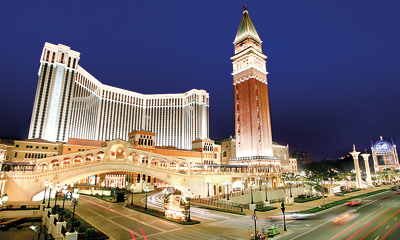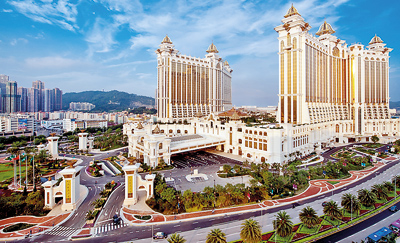Sunday Times 2
Millions burn billions in gambling town Macau
A tiny island of 586,000 people to the west of Hong Kong has drawn the attention of Sri Lanka whose lawmakers favour more private gambling ventures in Colombo and those, including religious figures, who scowl at the thought. The public debate over two new casino complexes combining commercial and residential real estate – with one involving an Australian gambling operator – has mainly swung between the projected, theoretical economic benefits and deeper infestations of corruption and organized crime.

The Venetian Macao casino operated by an American group (Photo courtesy of Macau Government Tourist Office)
The public believe that Sri Lanka is trying to emulate Macau, the world’s largest gambling town. Chinese gamblers call it “Ou Mun” (meaning trading gate), while its former plundering colonial rulers the Portuguese named it ‘A Ma Gao’, after the oldest Chinese temple A-Ma. The name evolved into Macao. This island of just 29.9 square kilometers has 35 casinos and four hospitals.
The whole island, made up of a peninsula linked to China, two smaller islands and an area called Cotai reclaimed from the sea, would fit inside the district of Colombo, with hundreds of sq kms to spare. Gambling has existed here since 1847.
It is no Monaco or even Hong Kong, but 28 million visited Macau, 16.9 million of those were Chinese and 7 million from Hong Kong, also mostly Chinese. A million came from Taiwan. Half of the visitors stay no more than a day in any of 102 hotels offering 27,719 rooms. There is not much to do except gamble all day, eat, drink, and have sex at a sauna (56 of them) or a nightclub (21 of them). For Chinese, whose national pastime is gambling, Macau is the playground where some pay with their lives when in debt.
Visitors ploughed US$ 28.4 billion into Macau from January-September last year. US$ 24.8b of that was on gambling, US$ 716 million on hotels, and US$ 2.9b other expenses, according to Macau government data. Comparatively, Apple’s profits in the first three quarters this year, was US$ 29.5 billion.
Macau has deposed Las Vegas from the top, but not without the aid of Nevada heavyweights, especially two Jewish billionaires, Steve Wynn and Sheldon Adelson, who have faced various lawsuits and the scrutiny of US federal investigators. Wynn’s former partner Kazuo Okada, a Japanese, who runs Universal Entertainment, is facing criminal charges in the Philippines for using front companies.
The Americans Adelson and Wynn brought Las Vegas to Macau – gambling, food and beverage, brand name luxury hotels, luxury label shopping (Louis Vuitton, Chanel, Prada, Chaumet, Longchamp, etc), luxury residences, spas, cabarets, boxing, pop and rock acts (Rihanna is sold out for September), members only clubs with women thrown in for good measure, as well as events such as adult sex expos, toilet expos, and funeral undertaker conventions. The events industry is Macau’s sideshow. Those who come, stay no more than two days.
In 2004, Sands Macao became the first American-run casino in Macau. Two years later, Wynn Macau opened. In 2007, MGM Grand opened, as did Grand Lisboa and The Venetian Macao. The Venetian Macao got a five-year corporate tax holiday that ends this year. Last year, Las Vegas Sands agreed to pay Macau 14.4 million patacas (the local currency) as a substitute for a 12pc tax on dividends, the company reported in US filings.
Despite the foreign players, the lord of the town is Chinese billionaire Stanley Ho Hung-sun, now out of the picture because of old age and illness. His family company, Sociedade de Turismo e Diversões de Macao (STDM) still dominates. His monopoly lasted for 40 years from 1962, when he was awarded the very first concession. More than a decade ago, Macau awarded more concessions, bringing in foreign casinos. Ho’s subsidiary SJM also won concessions.

The Galaxy Macau Casino operated by a Hong Kong-based Chinese group (Photo courtesy of Macau Government Tourist Office)
In Macau, where gambling and its bed fellows including the sex trade, loan sharks and organised crime, are the only games in town, just 54,835 people are employed in casinos, largely low-level jobs such as dealers (23,895 of them), clerks, cashiers, pit bosses, floor assistants, betting service operators and so on. Foreigners hold most top tier jobs. A hotel waitress would earn 8,500 Macau pataca a month (140,000 rupees), below what a waitress, or driver, would earn in Hong Kong.
From the time one leaves Macau’s immigration hall, neon-lit invitations for hostess nightclubs and brothels (parading Chinese, South Koreans, Thais, Vietnamese, Filipinos, Russians,) masquerading as saunas, massage parlours, and karaokes, are unavoidable.
The island offers 22 games of chance and 5,485 gambling tables, data from the Macau Gaming Inspection and Coordination Bureau show. But in 2002, there were just 339 gambling tables. The biggest game is baccarat, accounting for 70 per cent of gambling revenues.
There are six main casino companies in Macau – SJM Holdings, Galaxy Entertainment Group (which runs Galaxy Macau), Sands China (70 percent owned by Las Vegas Sands), Melco Crown Entertainment (James Packer is co-chairman), Wynn Macau and MGM China. They are all listed on the Hong Kong Stock Exchange. Casinos are taxed at an effective rate of 38pc to 39pc on gambling revenues. This includes 35pc tax on gross gambling revenues, 1.6pc to a foundation, and 2.4pc to a social security fund.
For Macau’s Chinese rulers, who took over from the Portuguese in 1999, gambling is butter and jam for the bread. Macau’s gambling revenue was HK$ 295 billion last year (5 trillion rupees), up 14pc, compared with HK $260b in 2011. Gambling by whales, aka the high rollers, accounted for 69pc with revenues of HK$205b, up 8pc. Mass market gambling revenue was HK$ 77.7b, up 33pc.
More than 82pc of Macau’s government revenue comes from gambling taxes, which last year was 98.1 billion pataca (that is more than 11 times China’s loans to Sri Lanka), up by 14.2pc as of November. In the first half, gambling revenue was 171.4b pataca (2.8 trillion rupees), up 15.3pc , government data show. Macau collected profit tax revenue of 1.7b pataca.
Macau’s US$ 43.6b economy has chugged along accumulating fiscal surpluses for the past five years, averaging 21.7pc of GDP. Out of 119 governments rated by Moody’s, Macau is one that is debt free. At end June, Macau had a forex reserves pile of US$ 15.9b, down 5.6pc, year-on-year. But this pales in comparison to Hong Kong’s US$ 39.1b. And perilously indebted Sri Lanka had US$ 6.9b, thanks to migrant workers whose wages fund the BMW imports for loss-making ministries and 244 state enterprises. But, Sri Lankan migrant workers, who get a 100,000 rupee duty-free “allowance”, are prohibited from bringing in even a bicycle for a child, a table or a chair. Macau is a free port, where no one is discriminated through laws that favour duty-free luxury imports for a select few.
Despite its stature as the big cheese in gambling, Macau is not Disneyland. Thousands live in decrepit public housing. Some buildings have been condemned as unsuitable for habitation. There are 2,543 buildings that are 30 years old. Out of a 360,700 workforce, 6,400 are jobless. There are shortages of nursing homes – 1,300 beds for 40,000 elderly. Problem gamblers increased 50pc last year and 13,000 are gambling addicts. Since November, one gambler a week sought help from the Social Welfare Bureau.
Some residents are known to smuggle pork for a living. Labour protests are not uncommon. The back alleys of Macau resemble any Chinatown, smelly, messy and filthy. But compared with Asia’s brothel Bangkok, a haven for foreign fugitives, paedophiles, terrorists, murderers, and hustlers, and where 398 British visitors were killed last year, Macau is a wild waterslide ride, if only for a day.
Follow @timesonlinelk
comments powered by Disqus

